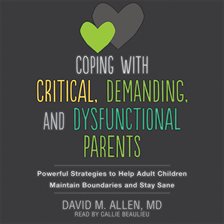
eAudiobook
hoopla Instant
Coping with Critical, Demanding, and Dysfunctional Parents
Year
2019
Language
ENGLISH
Duration
7h 40m 52s
Publication Information
New Harbinger Publications
Summary
Do you have a parent who is invalidating, critical, demanding, or hateful? In this important and much-needed guide, you'll learn how to set boundaries; uncover the hidden motives behind your parent's behavior; put a stop to repetitive, hurtful interactions; and foster healthier relationships. There's no sugarcoating it-if you grew up with a parent who made you feel invalidated or unloved as a child, your pain is very real. In some cases, you may decide that you want to remove this parent from your life, and that is a valid choice. But for many people, dealing with a problem parent becomes a necessary part of life, for whatever reason. If you're one of these people, this book can help. Written by a psychotherapist and expert in relationships, Coping with Critical, Demanding, and Dysfunctional Parents will help you develop unique assertiveness strategies based on the characteristics of your own family dynamics. You'll learn powerful communication skills to help you build boundaries and put a stop to your parent's hurtful behavior. And, most importantly, you'll learn to advocate for your own needs. If you've "had it up to here" with a parent who makes you feel as though you're just not good enough, this invaluable guide can help you put an end to toxic interactions while maintaining peace in your family. Adult children whose parents are invalidating, critical, demanding, or hateful require skills to advocate for their own needs. In this much-needed guide, readers will learn how to employ unique assertiveness strategies based on the characteristics of their own family dynamics; uncover the hidden motives behind their parents' behavior; put a stop to repetitive, hurtful interactions without cutting off their problem parents; and foster healthier relationships.